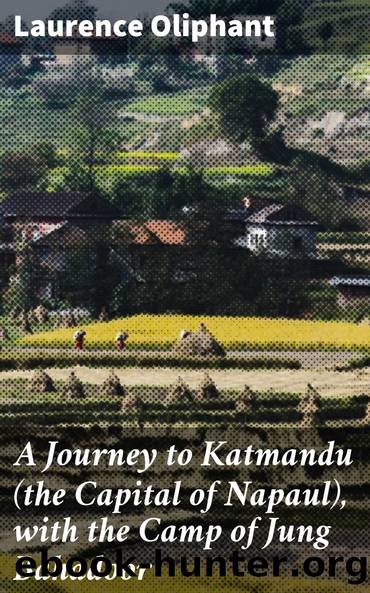A Journey to Katmandu (the Capital of Napaul), with the Camp of Jung Bahadoor by Laurence Oliphant

Author:Laurence Oliphant [Oliphant, Laurence]
Language: eng
Format: epub
Tags: History, United States, General, Travel
ISBN: 9781425522520
Google: vsZ-GgAACAAJ
Publisher: MPublishing
Published: 2006-09-15T00:18:22+00:00
CHAPTER X.
The titles of his Excellency General Jung Bahadoor Coomaranagee in EnglandâExtraordinary notions of the British public on Indian affairsâJung Bahadoorâs conciliatory policyâOur unsuccessful attempt to penetrate beyond the permitted boundariesâDangerous position of the Prime MinisterâHis philanthropic designsâGreat opposition on the part of DurbarâNative punishmentsâA Nepaulese chief-justiceâJungâs popularity with the peasantry and army.
The rumours in England during Jung Bahadoorâs short residence thereâof who he was, of what position he held, of his having taken his greatest enemies with him to keep them from conspiring against him while absentâof his being at least a Prince, if not the Rajah himself in disguiseâwere as far from correct, and as improbable, as were the numerous stories related of him in the newspapers, many of which had no foundation whatever, and in no way redounded to his credit.
The subject, however, of so much speculation was generally too much pleased with his notoriety to care for the means which in some measure obtained it for him; and I have heard him repeat with great glee some imaginary anecdote of himself, or laughingly enumerate the various appellations by which he had been known. Amongst the few words of English which he could pronounce were those by which he was most frequently addressedâsuch as, the Prince, the Ambassador, your Highness, your Excellency, the Minister, Jung Bahadoor, Jung, or more often âthe Jung.â Whilst the appearance of the Coomaranagee Polkas showed an unusual amount of correct information on the part of the publisher.
Such ignorance might have been expected from the utter indifference manifested in England towards Indian affairs. The ideas of John Bull upon the subject are often ludicrous in the extreme, as he finds it impossible to divest himself of the preconceived notions which he surely must have been born with when he pertinaciously imagines that all dark-coloured people have woolly heads and thick lips, and speak the broken English of the negro; nor has he the slightest conception of the relative position of great towns in India, or which States are independent; or who the Nizam is, or if his contingent is not some part of his dress; or whether the Taj is not the husband of the Begum mentioned in Pendennis. He has a vague notion that nabobs come from India, and has heard perhaps of cabobs, but what the difference is, or whether they are not articles of Indian export usually packed in casks, he has not the most remote conception. For all the light, therefore, that John Bull could throw upon the subject of who or what Jung Bahadoor was, besides being the Nepaulese ambassador, or where the country was that he came to represent, it might remain a mystery to the present day.
But even supposing the public were better informed on Indian affairs, it would not be a matter of surprise that they should be under a misconception as to what Jungâs position in his own country might be, seeing that it is not usual amongst European nations to send their prime ministers on foreign missions.
Download
This site does not store any files on its server. We only index and link to content provided by other sites. Please contact the content providers to delete copyright contents if any and email us, we'll remove relevant links or contents immediately.
Kathy Andrews Collection by Kathy Andrews(10509)
The remains of the day by Kazuo Ishiguro(7543)
Spare by Prince Harry The Duke of Sussex(4188)
Paper Towns by Green John(4165)
The Body: A Guide for Occupants by Bill Bryson(3791)
Be in a Treehouse by Pete Nelson(3206)
Harry Potter and the Goblet Of Fire by J.K. Rowling(3025)
Goodbye Paradise(2950)
Never by Ken Follett(2873)
Into Thin Air by Jon Krakauer(2695)
The Remains of the Day by Kazuo Ishiguro(2614)
The Genius of Japanese Carpentry by Azby Brown(2602)
The Cellar by Natasha Preston(2592)
Drawing Shortcuts: Developing Quick Drawing Skills Using Today's Technology by Leggitt Jim(2529)
120 Days of Sodom by Marquis de Sade(2428)
Architecture 101 by Nicole Bridge(2348)
The Man Who Died Twice by Richard Osman(2290)
Machine Learning at Scale with H2O by Gregory Keys | David Whiting(2267)
Fairy Tale by Stephen King(2058)
